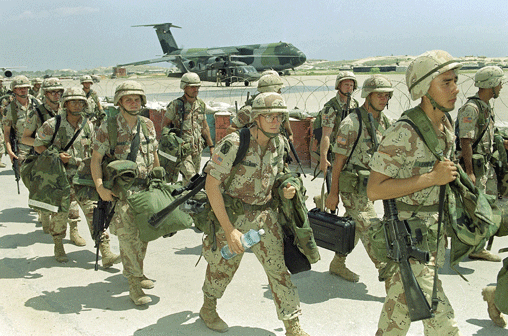Bribery
Charges
Hit Panalpina

The U.S. Justice
Department has intervened in a whistleblower lawsuit against Kellogg
Brown & Root (KBR), Panalpina Inc. and EGL that alleges that employees
of the two freight forwarders doing business with the companies provided
unlawful kickbacks to KBR transportation department employees. KBR is
the prime contractor under the Logistics Civil Augmentation Program
(LOGCAP III) contract for logistical support of U.S. military operations
in Iraq.
The whistleblowers also allege overbilling
by a KBR subcontractor in the Balkans, Wesco, under a military contract.
The United States is pursuing allegations
that the two freight forwarders, Eagle Global Logistics (which has since
merged with TNT Logistics and become CEVA) and Panalpina provided unlawful
kickbacks in the form of meals, drinks, and tickets to sports events
and golf outings to KBR employees.
The government will seek damages and penalties
under the False Claims Act and common law, as well as penalties under
the Anti-Kickback Act.
The United States has declined to intervene
in the remaining allegations of the relators’ suit.
The lawsuit was filed in U.S. District Court
for the Eastern District of Texas under the qui tam or whistleblower
provisions of the False Claims Act by David Vavra and Jerry Hyatt who
have been active in the air cargo business–the industry relevant
to the case.
Under the qui tam or whistleblower provisions
of the False Claims Act, a private citizen, known as a "relator,"
can sue on behalf of the United States. If the suit is successful, the
relator may share in the recovery.
"Defense contractors cannot take
advantage of the ongoing war effort by accepting unlawful kickbacks,"
said Tony West, Assistant Attorney General of the Civil Division of
the Department of Justice.
"We are committed to maintaining
the integrity of the Department of Defense's procurement process."
The United States previously intervened
in and settled the relators’ allegations that EGL included non-existent
charges for war risk insurance in invoices to KBR for air shipments
to Iraq, costs that KBR passed on to the Army.
Two EGL employees pleaded guilty to related
criminal charges. EGL paid the United States $4 million in the civil
settlement.
The government also intervened in and
settled the relators’ allegations that EGL’s local agent
in Kuwait, a company known as Al-Rashed, overcharged it for the rental
(or demurrage) of shipping containers.
The United States resolved potential claims
arising from that matter against EGL for $300,000.
Finally, EGL paid the government $750,000
to settle the relators’ allegations that the company provided
kickbacks to employees in KBR’s transportation department.
Former EGL employee Kevin Smoot and former
KBR employee Bob Bennett pleaded guilty to related criminal charges
in federal court in Rock Island.
For Panalpina, these new charges could
also represent an even further challenge.
As a result of a 2007 Department of Justice
and Securities and Exchange Commission corruption investigation in Nigeria,
the Swiss logistics giant Panalpina said it was not possible to receive
official customs clearances for air and ocean freight shipments fast
enough in Nigeria to meet customer’s demands without offering
“facilitation payments” that violated anti-corruption laws.
In August 2008, Panalpina said these compliance
concerns had forced it to withdraw completely from the West African
country Nigeria after 50 years of service there.
In other words Panalpina was just doing
business as business is done in Nigeria and ended up paying fines for
that privilege and decided to pack West Africa in altogether.
Interestingly on April 29, 2010, Panalpina
posted the following statement on the company website:
“In view of the advanced stage of
the settlement negotiations with the U.S. Department of Justice (DOJ)
and the U.S. Securities and Exchange Commission (SEC), Panalpina has
decided to reserve CHF 120 million, an amount anticipated to cover fines,
other penalties and legal expenses relating to the settlement of both
the U.S. Foreign Corrupt Practices Act (FCPA) and the U.S. antitrust
investigations.”
This newest case is being prosecuted as
part of a USA National Procurement Fraud Initiative that was initiated
in October 2006 with formation of a National Procurement Fraud Task
Force in USA.
Heiner/Geoffrey
|